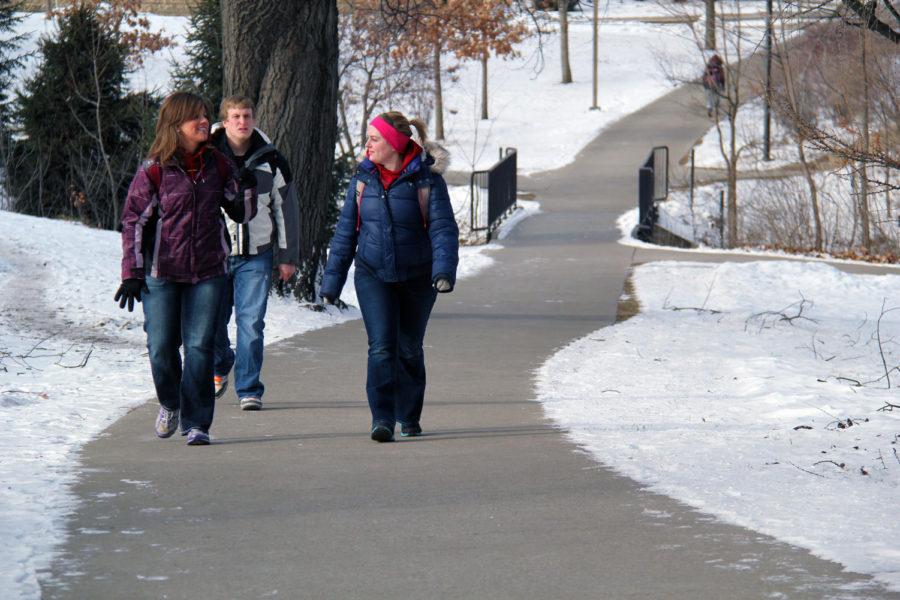How to survive winter weather at Iowa State
Photo: Blake Lanser/Iowa State Daily
Students walk to and from class on a daily basis, but when weather prohibits basic travel, ISU road crews work around the clock to make sure sidewalks are cleared for students the next morning.
January 23, 2013
The spring semester just began at Iowa State, although that is not to say that warm weather and chirping birds are here yet. With the winter season in full swing, there are plenty of things to be aware of to survive the next few months.
“If it’s happening outside, basically we’re handling it one way or another,” said Lester Lawson, campus services manager with Iowa State’s Facilities Planning & Management.
Handling weather can be tricky, and in the winter this sentiment is heightened as snow, sleet and ice are prevalent.
Lawson explained how this is carried out to ensure the utmost safety for drivers and pedestrians alike on campus, “If it’s a quarter inch, that starts snow removal from sidewalks and doorways. Once it hits an inch, then we start on streets and parking lots, we do our best to keep it as clear as possible.”
He acknowledges that parking is limited on campus, and keeping the lots as clear as possible is critical.
According to Facilities Planning and Management, there are 162 acres of parking lots on campus. For these 162 acres to be clear, “we have several plows and they keep making a circle around each lot [until the snow is cleared].” He also adds that the bigger lots get top plowing priority and serve as alternative parking sites in the event of lot closings or limitations.
Given Facilities Planning and Management’s efforts to keep the campus safe, the oft-desired snow day is a rare occurrence at Iowa State.
“It’s very seldom [to have a snow day]”, said Tim Watson, supervisor of plant services with Facilities Planning and Management.
Lawson also agreed by adding, “I think there have only been three or four [snow days] in my 30 years here.”
Albeit rare, students will be alerted of class cancellations and delays via the ISU homepage, as well as from local radio and television outlets.
According to the university, class cancellations and delays are determined by the vice president for business and finance, Warren Madden. Madden works in conjunction with the president, provost and other university and public safety officials to make this decision.
If classes are cancelled or delayed, that decision will typically be made in the early morning hours. If classes remain in session, and a certain level of safety has been reached, students are urged to attend class unless notified by their professors.
In days of inclement weather, the university website states: “Safety is the first concern, but a strong second is providing students with a good education. Each class is a lost educational opportunity. Iowa State doesn’t have built-in make-up days in the calendar and doesn’t extend the school year when days are lost.”
When classes are in session, the CyRide bus system is expected to run as scheduled. If driving or riding is not an option, however, Lawson and Watson both iterate that footwear is of utmost importance.
“Wear good shoes, regular snowboots, that type of thing. Not the high heels,” Lawson says.
Although Facilities Planning and Management works diligently to maintain safe roads and paths, Lawson admitted, “there’s only so much we can do.”
Dressing appropriately for the weather as well as allotting added travel time are a couple ways to best assure personal safety and to enjoy the scenic winter weather found at Iowa State.

















